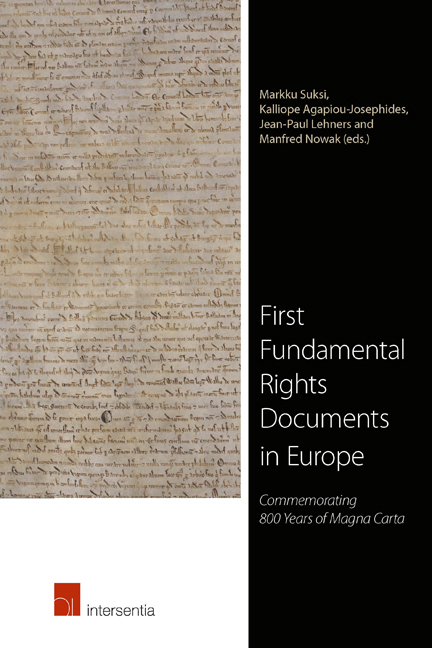Book contents
- Frontmatter
- Preface
- Contents
- List of Authors
- 1 Introduction
- PART I
- 2 The United Kingdom: From Magna Carta 1215 to the Rule of Law
- 3 Ireland: Individual and Group Rights in Ancient Irish Law
- 4 Italy: The Liber Paradisus — A Vision of Good Governance
- 5 Hungary: The Historic Constitution as the Place of Memory
- 6 Belgium: From Collective Privileges to Individual Rights
- 7 Austria: Manorial Regulation of Mining and Use of Forests as Potential Antecedents in Fundamental Rights
- 8 Spain: The First Cry for Justice in the Americas — From Antonio de Montesinos to the Laws of Burgos (1512)
- 9 Lithuania: From Equality to Inequality and to Equality Again
- 10 Poland: From the Golden Liberty of the Nobles to Fundamental Rights
- PART II
- Index
2 - The United Kingdom: From Magna Carta 1215 to the Rule of Law
from PART I
Published online by Cambridge University Press: 15 December 2017
- Frontmatter
- Preface
- Contents
- List of Authors
- 1 Introduction
- PART I
- 2 The United Kingdom: From Magna Carta 1215 to the Rule of Law
- 3 Ireland: Individual and Group Rights in Ancient Irish Law
- 4 Italy: The Liber Paradisus — A Vision of Good Governance
- 5 Hungary: The Historic Constitution as the Place of Memory
- 6 Belgium: From Collective Privileges to Individual Rights
- 7 Austria: Manorial Regulation of Mining and Use of Forests as Potential Antecedents in Fundamental Rights
- 8 Spain: The First Cry for Justice in the Americas — From Antonio de Montesinos to the Laws of Burgos (1512)
- 9 Lithuania: From Equality to Inequality and to Equality Again
- 10 Poland: From the Golden Liberty of the Nobles to Fundamental Rights
- PART II
- Index
Summary
INTRODUCTION
Magna Carta of June 1215 has been an iconic document in the legal and political histories of England and Wales, on and off, for 800 years. Arlidge and Judge (respectively an eminent criminal practitioner and scholar, and Lord Chief Justice of England and Wales from 2008 to 2013) claim that it ‘continues to be a powerful symbol of our liberties’ and that ‘within its clauses are the germs of constitutional principles which resonate to this day’.
In the document, only later referred to as ‘Magna Carta’ or ‘The Great Charter’, the King purported to grant certain ‘liberties’ to ‘all freemen of our Kingdom’. The document also granted certain ‘freedoms’ and ‘rights’ to the Church, and to freemen and cities of the Kingdom. These liberties were not, then, regarded by the King — or his predecessors — as inherent or ‘natural law’ rights. They were privileges to be granted by the monarch to and enjoyed by limited classes of people and institutions, rather than the universal rights and freedoms of today.
The sealing of Magna Carta by the King in 1215 was not however the first time that an English King had granted liberties to his subjects — Henry I had done so in his 1115 Charter of Liberties, for example. In their rebellion in 1215 the barons were seeking, among other things, the restoration of ancient rights and liberties — life, liberty and property — which had been granted in earlier laws and charters and which had been rejected by King John. Quite apart from such charters, the principle that people enjoyed ‘ancient liberties’ and that monarchs would be expected to guarantee them had been embedded in the culture of England since the time of Edward the Confessor, King from 1042–1066 (in the Leges Edwardi), and in earlier Anglo-Saxon times, well before the Norman conquest of 1066 and the establishment of the feudal system. The grant of rights and liberties came to be part of the deal or contract between the king and his people or ‘subjects’: he would provide protection, including protection of the law, in exchange for their loyalty and service. As Blackstone put it ‘protection and subjecthood are reciprocal’.
- Type
- Chapter
- Information
- First Fundamental Rights Documents in EuropeCommemorating 800 Years of Magna Carta, pp. 11 - 24Publisher: IntersentiaPrint publication year: 2015



